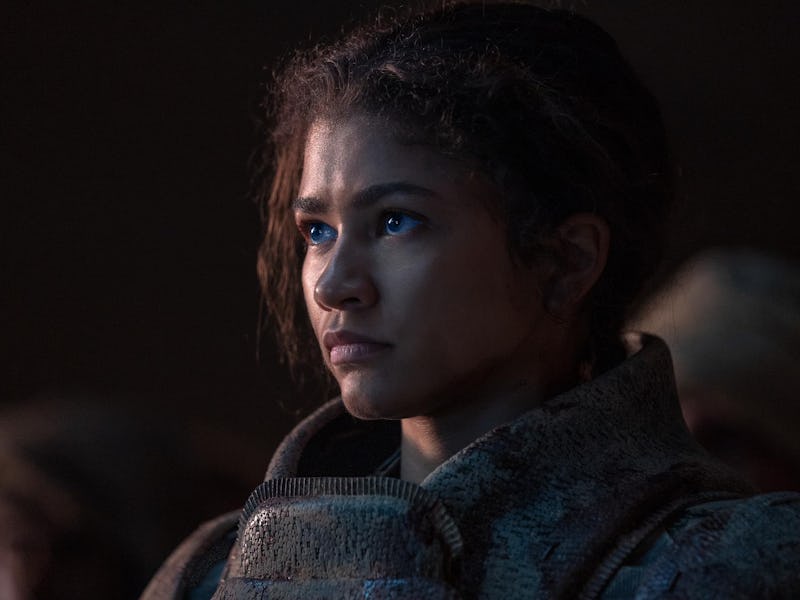Dune 2 Totally Changed Chani's Character For One Crucial Reason
Co-writer Jon Spaihts reveals that the important conflict that Chani embodies.

In Frank Herbert’s novels, Chani is the faithful companion to Paul Atreides (played by Timothée Chalamet in Villeneuve’s films). She’s by his side, passive and steadfast, while he colonizes her homeworld of Arrakis and brings a holy war to the rest of the galaxy. Since Dune is meant to be a takedown of the white savior trope, this is just as tragic as it sounds. But in adapting those themes to the screen in Dune: Part Two, Villneuve and his co-writer Jon Spaihts had to think critically about Chani’s role in Paul’s story, and approach that tragedy differently.
Paul’s rise on Arrakis is told chiefly through his romance with Chani. As he gains the trust of the Fremen and learns their ways, he’s also resisting the pull to power. That resistance aligns with Chani’s own hope for her people. While many of the Fremen believe that Paul is Lisan al Gaib — the messianic figure meant to deliver the Fremen “to paradise” — Chani wants to believe that a savior will come from within the Fremen ranks.
All that changes when Paul imbibes the Water of Life and totally submits to his expected role. It creates an immediate rift between him and Chani, and according to Villeneuve, it was crucial that we see Paul change through Chani’s eyes. “The idea was to make sure that we will unfold Paul’s story through this relationship,” the director told Inverse, “and that the very specific [turning point of] Paul will be seen roughly more from the perspective of Chani.”
Chani’s romance with Paul is crucial to Dune’s tragic turn.
By the end of Dune: Part Two, Chani has become Paul’s sole dissenter. It puts her at odds with every member of the Fremen, especially Stilgar (Javier Bardem), whose blind fanaticism personifies one half of the novel’s subtler ideas.
Spaihts posits that Herbert’s Dune is a fairly internal story. “We hear people think a lot in Dune,” the writer tells Inverse — and their internal monologues go a long way in supporting Herbert’s anti-colonialist themes. In the novel, the oppression of the Fremen is two-fold. It manifests in the more direct rule of the Padishah Emperor, but there’s also the influence of the Bene Gesserit and their false prophecies. It’s an elusive but much more insidious form of oppression that tears the Fremen apart from the inside.
“Both of those things are the subject of fierce interior debates in the second half of the novel,” Spaihts explains. In Herbert’s Dune, the Fremen are subtly divided between “orthodoxy,” a widely-accepted spiritual creed, and “orthopraxy,” which values action over faith. “What we needed to do in adapting that to film was to externalize that debate, to make it something that we can see and hear.”
Villeneuve and Spaihts use Chani and Stilgar to personify Dune’s subtler themes.
It was Villeneuve’s choice to position Stilgar and Chani on opposite sides of that debate. Stilgar represents a more orthodox point of view, while the more practical Chani puts her faith in the Fremen and their way of life. With these two characters at odds, the novel’s internal conflict is effectively made manifest — but the once-passive Chani also gains a much needed “core of strength.”
“If there was one way in which Denis is pushing back on the novel in Dune: Part Two, it is in the novel’s tendency in its second half to sweep the female characters off stage for long stretches,” Spaihts continues. Chani’s just one example of that sidelining. Villeneuve and Spaihts remedy that — and strengthen their ideas on colonialism — by elevating three female characters to prominence. Florence Pugh’s Princess Irulan is “the face of imperialism,” while Paul’s mother, Lady Jessica (Rebecca Ferguson) represents “the cultural colonization of the Fremen,” Spaihts says.
Chani, meanwhile, stands in for the inner integrity of the Fremen. That’s what makes her stance against Paul so crucial, and Part Two such a clever adaptation of Dune’s subtler themes.